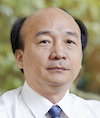- Distinguished Professor, Department of Physiology, College of Medicine, National Cheng Kung University, Taiwan
Professor Shaw-Jenq (Sean) Tsai received his PhD degree from the University of Wisconsin-Madison, USA in 1997. He then joined the Department of Physiology at the National Cheng Kung University, Taiwan, as an assistant professor in 1998. He was promoted to distinguished professor in 2008 in recognition of his great academic achievements.
Professor Tsai’s research focuses on investigating molecular mechanisms underlying important human diseases including cancer, polycystic ovarian syndrome, and endometriosis. He has published more than one hundred papers in prestigious journals such as Nature, Nature Communications, Journal of Clinical Investigation, Journal of Pathology, Cancer Research, Nucleic Acids Research, and Journal of Clinical Endocrinology & Metabolism.
In endometriosis research, Professor Tsai is the first person to demonstrate that ectopic endometriotic stromal cells can utilize cholesterol as the precursor to synthesize progesterone, which is then converted to 17β-estradiol exclusively in ectopic endometriotic cells. Professor Tsai’s group also demonstrates that prostaglandin E2 is a master regulator that controls steroidogenesis and angiogenesis, promotes endometriotic cell proliferation, and suppresses phagocytic ability of macrophage.
Recently, his team reported that endometriotic cells are much more sensitive to proinflammatory cytokine’s stimulation because of hypoxia-inducible factor-1α (HIF-1α)- mediated ERK activation. They demonstrate that HIF-1α is over-expressed in ectopic endometriotic stromal cell, which inhibits the expression of dual specificity phosphatase-2 (DUSP2), a negative regulator of ERK and p38 MAPK. Reduced expression of DUSP2 by HIF-1α results in prolonged activation of ERK and p38 MAPK, which ultimately leads to the hypersensitivity of ectopic endometriotic cells. They also discovered that hypoxia alters DNA methylation, histone modification, and translational switch to regulate critical genes in endometriotic cells. Most recently, his lab reported that hypoxia de-represses Yes-associated protein 1 (YAP1) and ultimately activates many biological processes. By blocking the hypoxia-regulated gene network, his lab demonstrated that endometriotic lesion can be efficiently reduced without compromising maternal fertility and the growth of offspring. These findings provide new insights of molecular pathology in the development of endometriosis and point to a new direction of endometriosis research.
Professor Tsai was appointed a WES Ambassador in 2011.

